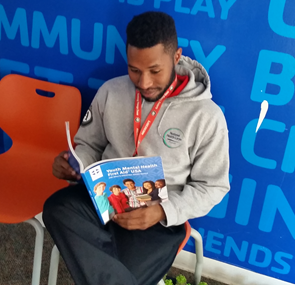Ready, If Necessary
 We opened the day with a simple but powerful demonstration. As our workshop leader explained that approximately 1 in 5 children have mental health conditions that have a severe impact on their everyday life, she went around the room with her finger and counted us off. At every fifth person, she stopped. By the end of her counting, five of us in our small group had been designated as having a mental illness. I took in the scenario and paused internally. How many of my friends or family members might have grown up dealing with a mental illness? How can something so common be so shrouded in mystery?
We opened the day with a simple but powerful demonstration. As our workshop leader explained that approximately 1 in 5 children have mental health conditions that have a severe impact on their everyday life, she went around the room with her finger and counted us off. At every fifth person, she stopped. By the end of her counting, five of us in our small group had been designated as having a mental illness. I took in the scenario and paused internally. How many of my friends or family members might have grown up dealing with a mental illness? How can something so common be so shrouded in mystery?I doubt that I am alone in my mistaken conception of how common mental illness is in this country. I think even fewer of us realize that some of these illnesses like anxiety and eating disorders have onsets as early as elementary school. I think this is part of what made the youth mental health first aid certification that we received on Saturday so important. It gave us the chance to learn the skills needed to handle emergent situations involving children with mental health conditions.
To do this, we learned a systematic approach to handling those moments that included listening without judgement, helping to direct the child to needed resources, and quickly assessing the risk of suicide and/or self-harm. The skills were not technically difficult,the concepts were not too dense, and from a purely biological standpoint, it doesn’t take much physically to speak. It is the mental and emotional gravity of being the first line of aid for a child in a moment of crisis or need that makes learning these skills so hard to implement and made the training so necessary.
 The official curriculum of the training was paired with the informal retelling and sharing of stories of people who had been deeply involved with or affected by children’s mental health. Our workshop leader has advocated for children with mental health conditions. She also has an autistic son. Her story of raising him had many parallels to raising a child with a mental illness. She frequently interjected her formal presentation with anecdotes about the difficulty of getting appropriate help, navigating medications, and dealing with stigma all while trying to give him the most normal upbringing she possibly could.
The official curriculum of the training was paired with the informal retelling and sharing of stories of people who had been deeply involved with or affected by children’s mental health. Our workshop leader has advocated for children with mental health conditions. She also has an autistic son. Her story of raising him had many parallels to raising a child with a mental illness. She frequently interjected her formal presentation with anecdotes about the difficulty of getting appropriate help, navigating medications, and dealing with stigma all while trying to give him the most normal upbringing she possibly could.We were also joined in the workshop by two juvenile probation officers who were able to give a unique insight into how mental health affects children’s behavior in the school system. They frequently chimed in to share their experiences and how much it weighs on them at times. I specifically remember one officer describing her visit with a child just before the child attempted suicide. She told the story with a straight face, but I could feel the discomfort of her body language permeate the room. Stories like these illustrate the difficulty of working with anyone with mental health conditions and how high the stakes are when these people don’t received the proper care.
With this training under my belt, I feel a little more prepared to provide help if the moment deems it necessary. In a perfect world, situations requiring first aid would be few and far between because of an excess of mental health care providers who can attend to everyone who requires aid. Unfortunately, we are likely years (if ever) away from reaching this state. In the meantime, many of the AmeriCorps members of the National Health Corps Florida Program are trained and ready to step in and help out, if necessary.
This blog post was written by NHC Florida member, Eric Bethea.
Eric serves at the YMCA in Duval County as a Health Educator.